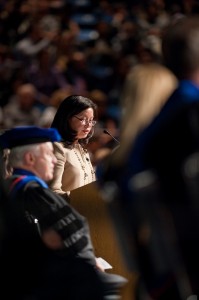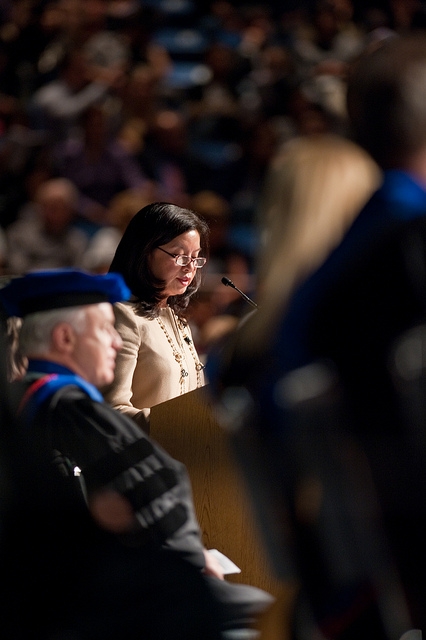
Retail executive Jenny Ming speaks May 27 at the College of Business spring convocation (Robert Bain, University Photographer).
By Sarah Kyo, Public Affairs Assistant
Jenny Ming, president and CEO of Charlotte Russe, spoke of her business experience and advised new graduates at the College of Business’ May 27 convocation.
An SJSU alumna, Ming earned her bachelor degree in clothing merchandising in 1978. Ming started out studying home economics before switching majors.
“Truth be told, I didn’t like my business classes all that much,” Ming said. “What I did like was the real-world application of what I had learned.”
Ming advised students to be happy to have a job, to do something about problems instead of complaining, and to stay focused and learn as much as they can.
In 2009, Ming was appointed to her current position with clothing retailer Charlotte Russe. Ming previously served as president of Old Navy from 1999 to 2006. Ming was also part of the executive team that launched Old Navy, a segment of the Gap, Inc., in 1994.
Ming was included in “Fortune” magazine’s list of 50 Most Powerful Women in American Business in 2003 and 2004.
The following is a transcript of her speech.
***
Thank you, Dean Steele. I’m honored to be here today.
And congratulations, class of 2011, on your exceptional accomplishments and the hard work it took to achieve them.
You are remarkable in many respects. You are the first class at San Jose State to have had the opportunity to apply for what I imagine are wonderful Thompson Global Internships, and thanks to your hard work here, eight of you have had the opportunity to apply classroom concepts to international business situations. Congratulations to you.
Your class swept the International Collegiate Business Strategy Competition, beating out 23 other universities to win first or second place in every division you entered.
You’ve had access to—and taken advantage of—more scholarships and more business clubs than any other class before you.
You’ve also taken more hybrid classes, been the first to pay more to the university than the state has, and been the first to experience faculty furloughs. You’ve seen more of the business cycle already than some people do in their whole careers. And you did all this before you even left school. That’s pretty fantastic.
Thank you also goes to the families and friends here today. You have supported these graduates, and it’s your day, too.
My own parents made difficult choices, changes, and sacrifices to bring me and my brothers and sisters to this country and to put us all through college. I suspect that all you parents out there know what I’m talking about—whether your family has recently come to the United States or been here for many generations. Most of us are immigrants, and this country—our adopted home—offers enormous opportunity through education. I believe that each of you students and your families have a special appreciation of how worthwhile the privilege of an American education is.
I’m inspired by you today, as I am whenever I hear students talk about their education and the experiences that were important to them. You’ve shown that you know how to succeed, and—more importantly—learned what it takes to help others succeed, as your family and friends have helped you.
Here’s my story. I graduated from San Jose State in 1978, and even though my professional life has been spent in the business of retail, I wasn’t a business major. My major was home economics. In the 1970s, I thought it was the only practical choice. In fact, I assumed it was the only field open to me, and I had decided to be a home ec teacher.
Then in my junior year, the state closed the program… and I had to figure something else out.
My boyfriend, Mitchell—now my husband—suggested I take some business classes. If I had to do it over again, I would take more, but because of his advice I at least found myself studying marketing and anything else in the business program I thought sounded “creative,” along with my fashion merchandising classes.
Truth be told, I didn’t like my business classes all that much. What I did like was the real-world application of what I had learned—my continuing education, which I got with my first job after college and still get, with every job or volunteer position I’ve held since.
Of course, I didn’t enter the job market at a time when the United States was just pulling out of the most serious recession in generations. My class wasn’t being reminded that difficult times require individuals to reach new levels of creativity and accomplishment to find jobs.
But you are. And I believe that with a passion for what you do and a commitment to working hard, you are well equipped for the age ahead… especially if you listen to my Top Three Tips.
You knew you wouldn’t be able to get out of here without some last-minute advice, didn’t you?
These three things are what I wish someone had told me when I graduated from college. Knowing them, I would have felt a lot better about the choices I was making and about what I was doing.
Tip Number One: Be happy to have a job. I mean it—a job. Not necessarily the perfect job, or the job that’s going to look great on your resume, but A JOB. Because a job is where you’re going to learn. It could be volunteer work. It could be an internship. You don’t need a full-time job to get started. The worst thing is doing nothing.
Here’s an example. When I graduated I wanted to get into retail, so I applied to two executive training programs in the Bay Area, and I got into both of them. The better known and respected of the two was Macy’s. The other one was Mervyn’s.
So, I chose Mervyn’s. I made that decision because I liked the store manager I’d interviewed with. That manager had made me feel like I could be part of their team, and that the people at Mervyn’s would be generous with their time and with their support of my development and growth. It turned out I was right. I was at Mervyn’s for eight years, I learned a lot, and I found it very rewarding.
All through my life, and particularly in my 20s and 30s, I’ve found that satisfaction and happiness are not about companies, or titles, or income. Instead, my happiness comes from learning and growing, finding what’s meaningful to me, and finding people who are willing to teach me.
Today when I interview people, I look for the ones who’ve done something unusual, because I believe that personal accomplishments affect professional ones. I look for someone who leads a balanced life and has a range of experiences. I still remember a woman who was hired at Gap. During her interview, she told me that she’d just biked across the country. I liked that she’d done something for herself. Following her own interests, and learning from them, gave her—and gives any person—the confidence to follow a personal direction in both career and life.
Learning and growing give life meaning. And when there are problems, which there always will be, you’ve got…
Tip Number Two: Don’t complain about problems. Do something about them. YOU have to make it happen. Once again, the worst thing is doing nothing.
Here’s another example. I wasn’t sure what to do during my first months with Mervyn’s when things weren’t going as smoothly as I’d hoped. The executive program included training in the stores, and I was having a hard time as the manager of the Serramonte linens department. My team of women—all older than I was—did a lot more talking than they did working. The store manager told me, “You’re never going to make it in this business because you’re such a pushover. You let everybody walk all over you.”
A pushover! I’d only been in the business nine months and already someone was saying I wasn’t going to make it. I decided I needed to tell my team what I expected, and the next day—literally—I did. “I need you to do your work, and not just chat,” I said. “If you don’t, you’ll get a new manager who is not going to be as nice as I am.” I offered to schedule their coffee breaks together, too. It worked, and I learned early on to set expectations and address problems fast.
So, don’t complain—do something. And that brings me to…
Tip Number Three: Stay focused, learn as much as you can, and make your own decisions. Do your best in whatever you’re doing, and enjoy the journey of that job. Your career is a long-term project—it won’t stop while you take advantage of all the opportunities a job offers. This is very important to me personally, and I don’t think many people appreciate it.
One way to keep your focus is by not comparing yourself to others. There’s always going to be somebody better than you are, and somebody worse. Always. The time you spend in a job has nothing to do with the time others spend in it. If you put a time limit on yourself, you won’t be happy, because it’s not the right focus. Doing your best at a job you enjoy is.
Staying focused helps you learn to make decisions for yourself—even those that might look risky to someone else. Everybody thought I was crazy to leave a big brand like Gap and do the startup at Old Navy, but I looked at it as an unbelievable opportunity. I felt the same when I left Gap Inc. after 20 years and then joined Charlotte Russe—it was the right time and the right opportunity. I wasn’t afraid to go for it, even when everybody was telling me differently.
There’s one more thing—not a tip, but something else I’ve learned along the way. I’ve always been very goal-oriented, and have always loved my job. Even now I could work 14 hours a day, and that can be a problem. It took me time to figure out how to balance my life.
Early on, I wanted to do it all. Perhaps you do, too. I had a career, a husband, and three kids, but it was wearing me out. I needed to learn to ask for help, and to set my priorities. Now I have a mandate that I’ve given myself—to leave work for other things. My family has always come first, and I also enjoy volunteering and serving on boards. You might like to spend time with your family too, or have a hobby, like to travel, or want to ride a bike across the country. Balance is a personal thing, but whatever you choose will help you set your priorities and provide the balance you need for a full and happy life.
So that’s it. Three tips for all the years to come, and this: Your education doesn’t end when you leave San Jose State. If you take advantage of your job, don’t complain, stay focused, and find the balance you need, this new phase is just going to be a continuation of your education—one that I hope will reward you your whole life.
Thank you, and best wishes.

